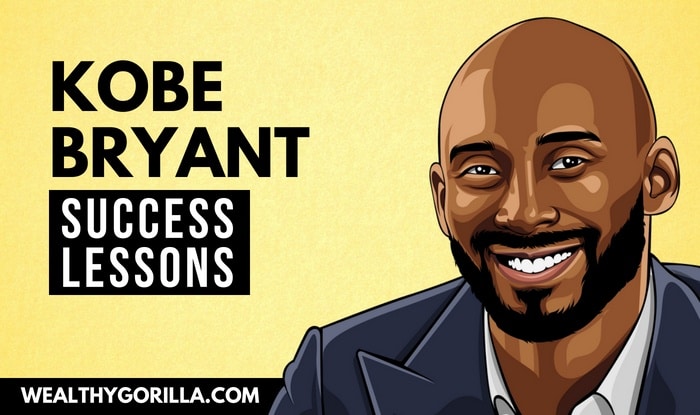Success
The Definitive Guide to Achieving Higher Testosterone Levels

As a man, your testosterone levels are a major driving force in your overall quality of life.
The problem is:
Testosterone levels in American men have been steadily declining over the past few decades.
In fact:
According to the research, approximately 24% of American men over the age of 30 have low testosterone levels (<300 ng/dL).
Now, the reasons for this generational decline in T are diverse but can largely be narrowed down to decisions regarding how we eat, train, and sleep. In this post, I’ll show you how to optimize these three areas so that you can move towards achieving and maintaining your energy, health, and virility well into old-age.
Taking the steps to naturally increase your testosterone levels will allow you to bring your A-game in every other area of life as well.
How To Eat For Naturally High Testosterone Levels

The building blocks of testosterone are formed by the foods you eat. If you don’t eat right, nothing else you do for testosterone will matter. This is why dialing in on your nutrition is the primary objective when looking to achieve hormonal balance.
How Body Fat Impacts Testosterone
Priority #1, when it comes to naturally increasing your testosterone levels, is to get in the range of 12-15% body fat. Research has consistently shown body fat to hold an inverse relationship with testosterone.
In other words:
The leaner you are, the more testosterone your body will naturally be able to produce.
This is because body fat produces an enzyme (called aromatase) that converts testosterone into the female sex hormone, estrogen. By lowering your body fat, you decrease the activity of this enzyme and allow more testosterone to remain unconverted.
Regardless of any preconceptions that you may have, there is only one rule of weight loss:
To be in a calorie deficit, i.e. to consume fewer calories than you burn.
If you follow this rule, you will lose weight regardless of what you eat. Notice how I wrote weight and not fat. If you want to ensure that this weight loss comes in the form of fat and not muscle, factors such as food choices, training, and sleep also come into play, which we’ll discuss coming up.
If you are currently over 15% body fat, then lowering your body fat is the single most important thing you must do to naturally boost your testosterone levels.
How Micro-Nutrients Impact Testosterone
Micro-nutrients are the vitamins and minerals that your body needs in trace amounts to ensure proper growth, development, and function.
After getting lean, the best thing you can do for your testosterone levels is to correct any underlying vitamin and mineral deficiencies that you may have.
With regards to testosterone, the most important micro-nutrients are vitamin D, zinc, and magnesium. Vitamin D can be acquired simply by spending more time in the sun. As for the other micro-nutrients, check out this great list of 25 powerful testosterone-boosting foods.
If including more natural, whole, and unprocessed foods in your diet seems difficult, then opt for a quality multivitamin. I emphasize the word quality because almost half of Americans take a multivitamin supplement, yet large portions of the population still have deficiencies.
Before buying a multivitamin, read the nutrition label and make sure that it delivers as close to 100% as possible of the daily value (DV) for the following:
- Vitamin A (only if it is mostly beta-carotene; otherwise keep it under 4000 IU)
- Vitamin C
- Vitamin D
- Vitamin E
- Chromium
- Copper
- Iodine
- Iron
- Manganese
- Selenium
Depending on the extent of your current deficiencies, topping up your micronutrient levels can have an instant and drastic positive impact on your T.
How Macro-Nutrients Impact Testosterone
Calories are made up of macro-nutrients, which in turn, are made up of fats, carbohydrates, and protein. Each macro-nutrient has its own role in supporting endocrine function.
1. Fats
Considering that testosterone is literally made out of dietary cholesterol, dietary fat is the most important macro-nutrient for testosterone production. But more important than the amount of fat in your diet is the source that the fat is coming from.
There are four types of dietary fat:
- Saturated fats – found in foods like whole eggs, beef, and milk.
- Monounsaturated fats – found in foods like avocados, almonds, and olive oil.
- Polyunsaturated fats – found in plant-based oils like soybean oil, corn oil, and sunflower oil.
- Trans fats – man made and found in foods like doughnuts, crackers, cakes and pies.
According to the research, saturated and monounsaturated fat intake hold a direct positive relationship with testosterone. On the other hand, polyunsaturated and trans fat intake actually lowered T-levels.
I make it a point to eat at least 4 whole eggs and an avocado daily. And if you’re concerned with heart disease or cholesterol, check out this study and this study to clear your confusion.
2. Carbohydrates
Next up we have carbohydrates. Carbs get a bad rep these days, but they are actually very important for T production.
A recent study provides further insight:
- Subjects were divided into two groups and tested for there free testosterone to cortisol ratio (fTC).
- Group 1 ate 60% of their daily calories from carbs.
- Group 2 ate 30% of their daily calories from carbs.
- After three consecutive days of training, subjects in group 2 had significantly lower fTC ratio (-43%) while subjects in group 1 maintained their fTC ratio.
Carbs are your body’s preferred source of energy, and not eating enough of them means putting your body under added stress in the form of increased cortisol levels; this is especially true if you’re lifting weights or doing any other type of strenuous activity.
Cortisol is the stress hormone and is negatively correlated with testosterone, i.e. higher cortisol = lower testosterone.
3. Protein
And finally we have protein.
Believe it or not, protein is actually the least important macronutrient for T production. This is because, given a fixed number of calories, increased protein intake means less of fat and carbs, both of which are more important for T.
To provide this with a scientific context, let’s observe the results from a study that looked at how protein and carb intake impacted testosterone:
- Subjects were divided into two groups.
- Group 1 ate a high-protein, low-carb diet.
- Group 2 ate a high-carb, low-protein diet.
- Calories and fat were the same for both groups.
- After 10 days, subjects in group 2 had 26% higher testosterone levels.
Does this mean that a low-protein diet is best for testosterone?
Well, not quite.
An important point is that the subjects in this study were not put on any type of exercise program, whereby a higher protein intake would be needed to aid muscle recovery.
So the bottom line is to consume enough protein to support muscle growth and recovery but not more.
How To Set Up Your Diet For Optimal T Production
Only after looking at the big picture of how body fat, micro-nutrients, and macro-nutrients factor in to the testosterone equation can we move towards figuring out the numbers. I’ll walk you through the process step-by-step.
As an example, let’s say you weight 185 lbs and are currently at about 17% body fat. So your first objective is to get in the range of sub-15% body fat.
Step 1: Figure out your Basal Metabolic Rate (BMR)
BMR is the amount of calories you’d burn if you were to do nothing but rest for 24 hours.
I recommend using the Katch-McArdle equation because, unlike other popular BMR equations, it takes into account body composition:
BMR = 370 + (21.6 x LBM in kg)
LBM is lean body mass, i.e. your weight without body fat.
From the example:
- 17% x 185 = 31.45 pounds of body fat
- 185 – 31.45 = 153.55 pounds of LBM
- 55 lbs = 69.65 kg
Using the Katch-McArdle equation => 370 + (21.6 x 69.65) = 1874 calories
BMR = 1874 calories
Step 2: Figure out your Total Energy Expenditure (TEE)
TEE is the total amount of calories you burn in a day.
TEE = BMR x Thermic Effect of Activity (TEA)
We estimate TEA with an activity multiplier:
- Sedentary: Spend most of the day sitting (e.g. desk job, bank teller)
- BMR x 1.2 = TEE
- Lightly active: Spend a good part of the day on your feet (e.g. teacher, car salesman)
- BMR x 1.35 = TEE
- Active: Spend a good part of the day doing some physical activity (e.g. waitress, mailman, lifting weights)
- BMR x 1.55 = TEE
- Very Active: Spend most of the day doing heavy physical activity (e.g. manual labor, bike messenger, lifting weights)
- BMR x 1.75 = TEE
Let’s say you fall under the category of lightly active:
- TEE = BMR x 1.35 = 1874 x 1.35 = 2530 calories
So your total daily expenditure is about 2530 calories.
Now obviously these formulas are just an estimate and not 100% accurate. But that’s completely okay because, in the grand scheme of things, they provide a good enough starting point after which you can adjust as you track and measure your progress.
Step 3: Figure out your Calorie Goal
Given that your current objective is to get to sub-15% body fat, I would recommend a calorie deficit of 500 calories. This would amount to about 1 lb of weight-loss per week. To ensure that this 1 lb comes in the form of fat and not muscle, make sure that you’re lifting weights and maintaining/gaining strength.
So your calorie goal is:
2530 – 500 = 2030 calories
Step 4: Figure out your Macros
With T-optimization as your goal, aim to consume about 25-30% of your daily calories from fat. Each gram of fat is about 9 calories.
So your fat intake is:
- Dietary fat intake (in grams) = (2030 x 0.25)/9
- Dietary fat intake (in grams) = 56
For protein, remember that you should eat enough to support muscle growth and recovery, but not more. As per the exact recommendation, I look towards researcher Eric Helms who, after analyzing and reviewing a lot of other studies, recommends a protein intake between 0.8-1.3 grams per pound (1.8-2.8g/kg) of body weight.
I would recommend sticking to the lower end of this range.
As per our example:
- 8 x 185 = 148 grams of protein
Carbs are the final piece of the macro-nutrient puzzle. Carbs and protein each provide 4 calories per gram.
Fill up your remaining calories with carbs:
- Carbs in grams = [ 2030 – (56 x 9) – (148 x 4) ]/4
- Carbs in grams = 233.5
So a breakdown of your macros is to consume 2030 calories per day coming from 148 grams of protein, 56 grams of fat, and 234 grams of carbs.
Again, these numbers are not meant to be exact. They are merely there to provide you with a starting point after which you track your progress and adjust along the way.
How to Train For Naturally High Testosterone Levels

Testosterone is the primary hormonal driver of muscle growth. When you lift weights beyond the capacity of what your body’s currently used to, testosterone is released to signal the target muscle tissue to grow in order to adjust to the stimulus.
There’s a tendency in the fitness community to make training more complicated than it needs to be. With regards to naturally increasing testosterone, your goal is simple:
To get stronger in a medium rep range on big compound movements.
I like to narrow my training down to 6 exercises in particular:
- Squat
- Deadlift
- Bench Press
- Overhead Press
- Weighted Pull-Ups
- Barbell Rows
I include isolation exercises in my training as well, but my primary focus is to get stronger on the above six exercises.
Check out this great guide to make your training more effective.
Here are some strength standards for you to strive for:
- Squat: 1.75x bodyweight for 5 reps
- Deadlift: 1.75x bodyweight for 5 reps
- Bench press: 1.35x bodyweight for 5 reps
- Overhead press: 1x bodyweight for 5 reps
- Weighted Pull-ups: 50% of bodyweight attached for 5 reps
- Barbell rows: 1.5x bodyweight for 5 reps
A note on cardio: Studies have found that men who consistently run long distances have lower long-term testosterone levels than even the non-athletic control group. If you like cardio and want to include it in your routine, make sure that you keep it under 3 hours per week and at high intensity rather than at slow-steady state.
How To Sleep To Ensure A Steady Surge of Testosterone Through The Night

If you do everything else right, but fail to get enough high-quality sleep, your results in terms of boosting T will be severely limited.
Research has shown that the majority of your body’s testosterone is released while you sleep and, that a lack of sleep seriously inhibits its production.
But it’s not only sleep quantity that matters; sleep quality is just as important. This is because T production peaks during the deep hours of rapid eye movement sleep. Research has shown that missing these cycles leads to lower testosterone levels in the long run.
Aim for 7-9 hours of sleep every single night.
As for sleep quality, follow these 4 steps to improve it…
Step 1: Sleep in a pitch-black room
By pitch black I mean that you should not be able to see your hand in front of your face.
Use a sleeping mask or invest in some blackout curtains like they have in hotels. Even a little bit of light can disrupt your sleep hormones.
Step 2: Keep room temperature between 60-67 degrees F.
Researchers have found this temperature to be ideal. If your thermostat is above this range, it could compromise your sleep.
Step 3: Cut off screen stimulation 2 hours before bed
This means that you should put your phone away and turn your TV off 2 hours before the time you intend on going to bed.
Screens emit an artificial blue light that messes with your hormones and makes your body think that it’s still daytime.
If using your phone is a necessity, then opt for night-shift mode to dim the light. F.lux is a great software that does the same for your laptop.
Step 4: Sleep with minimal clothing
Sleeping with light or no clothing allows your body to better regulate its temperature.
Long story short, getting a full 8 hours of high-quality sleep is the best way to ensure a steady surge of testosterone through the night.
RECAP – The Definitive Guide to Achieving Higher Testosterone Levels
Forget expensive unnatural treatments and testosterone injections. Focus on getting your nutrition, training, and sleep on point to move towards a life where you are able to express what you’re truly capable of.
Here’s a quick rundown of what we’ve gone over…
How to Eat:
- Priority #1 is to get in the range of 12-15% body fat
- Make sure you’re getting adequate amounts of vitamins and minerals through your diet (if you aren’t, then opt for a quality multivitamin supplement).
- Include more healthy fats (saturated and monounsaturated) in your diet.
- Eat enough carbs to power through your workouts
- Eat enough protein to support muscle growth and recovery but not more.
How to Train:
- Gain strength in a medium rep range in big compound exercises.
How to Sleep:
- Aim for 7-9 hours of high quality sleep every single night.
Maintaining your T above a particular range is a sure-fire signal that your mind and body are functioning near peak potential. As you can see, it all comes down to making simple changes in your diet and lifestyle.
Are you trying to achieve higher testosterone levels? Leave a comment below.
Success
The 30 Major Causes of Failure By Napoleon Hill

Have you ever read the book ‘Think & Grow Rich’?
If you’re a regular visitor to Wealthy Gorilla, then you definitely should have read the book by now!
Think & Grow Rich was written by Napoleon Hill and is considered to be one of the best self-development books of all time.
The book teaches the 13 principles of turning your desires into riches and contains hundreds of golden nuggets you can use to transform your life…
The 30 Major Causes of Failure
Within one of the chapters of Think & Grow Rich, Napoleon Hill lists the 30 major causes of failure. These are the reasons why 99% of people are failing in their lives.
The purpose of featuring and explaining these ‘major causes of failure’ within this article, is to show you why people fail, and how you can avoid doing the same thing in your own life.
Here are the 30 major causes of failure as described by Napoleon Hill:
1. Unfavourable Hereditary Background
The reason why this was put first on the list, was because Hill says it’s one of the toughest issues for people to overcome.
This basically means that someone is perhaps not naturally intelligent, and lack’s certain brainpower. They can take all the measures needed to improve their knowledge and become smarter, but they are still at a disadvantage.
2. Lack of a Well Defined Purpose in Life
If you don’t have a definitive goal that you’re setting out to achieve, a purpose that you’re trying to fill, you won’t become successful. You have nothing to hit, nothing to aim at. And therefore your direction is unidentified.
3. Lack of Ambition to Aim Above Mediocrity
There are many reasons why people might not have the ambition to aim above mediocrity. Whether it’s that they’re too lazy, too comfortable, too spoilt, or have no belief in “success”.
If you never have the ambition the aim higher, you never will aim higher than average. This means, you guessed it, you will never achieve more than average.
4. Insufficient Education
Another one of the major causes of failure is insufficient education. Don’t get this wrong. This does not solely mean a lack of formal education leading up to adulthood.
In many cases, and especially in various parts of the world, formal education is an issue. However, another big issue is that many individuals leave school and decide that they’ve done all the learning they needed to do.
When it comes to your career, specialized knowledge is a must, and it can only be learnt through experience on the job, and studying outside of working hours. Just turning up to work every day isn’t enough education.
5. Lack of Self-Discipline
Becoming successful isn’t easy. It takes a lot of discipline to consistently work hard at something until you finally start to achieve success from it.
There’s a lot of productive habits that need to be adopted in order to get the most out of your day, and therefore your week, month, and year.
6. Ill Health
Nobody can enjoy their success without good health, and in fact poor health can still hold you back from achieving it in the first place.
Here’s what causes ill health:
- Lack of exercise
- Over-eating junk foods
- Poor daily habits
- Over-indulgence in sex
7. Unfavourable Environmental Influences During Childhood
This essentially means that many people fail due to the environment they grew up in. Poor parenting, bad neighbourhoods, born into poor families etc.
It’s not a death sentence, but more people than not let these circumstances dictate their future. Something can be done, no matter what.
8. Procrastination
Everybody has a dream, but when it comes to taking action, most procrastinate. They wait until they’re ‘ready’, or until the ‘perfect time’.
Time goes by, but they’ve gone nowhere. Truth is, that they’ll never be a perfect time to start working on your dreams. You have to stop procrastinating and create a sense of urgency within your life.
9. Lack of Persistence
You won’t get anywhere without persistence. And persistence can be tough when you’re not seeing immediate results from all the hard work you’re putting in.
The truth is. Persistence is the key to everything. Every successful individual has had their own failures during their lifetime, but persistence meant that they got back up, and didn’t have to remain a failure.
10. Negative Personality
You know those people that always seem to complain about things, but never change them? How about the people who always tell you that they can’t do something?
Thinking negatively will only ever bring you a negative life. This is one of the biggest causes of failure, and changing your mindset from negative to positive should be a very high priority.
11. Lack of Controlled Sexual Urge
Most people will deny that this one affects them, but it does. The sexual stimulus has the power to influence people into action more than any other type of energy.
This means you’re likely to be spending a lot of your time chasing this, becoming distracted, and losing sight of your goals.
12. Uncontrolled Desire for ‘Something for Nothing’
Ever come across people who want something for nothing?
They believe that they can try and get what they want without helping anyone else get what they want. And that’s a big mistake.
You see, you only start to get the things you want in life when you’re able to help other people. Every business that succeeds, does so because it is helping enough people to be profitable.
13. Lack of a Well Defined Power of Decision
Napoleon talks about how good decision-makers are able to make quick decisions and then change them slowly, as opposed to the other way around. The ability to make quick decisions is incredibly important for success.
After all, if you’re unable to make decisions, then you’re not going to be able to build a business, that’s for sure. We make thousands of decisions every day, so this ability is key.
14. One or More of the Six Basic Fears
In Think & Grow Rich, Hill also describes the basic fears that all humans have in life. The basic fears are:
- Fear of poverty
- Fear of criticism
- Fear of ill health
- Fear of loss of love
- Fear of old age
- Fear of death
Possessing one of these six basic fears may also be one of the major causes of failure. It’s important to remember in this circumstance, that we all eventually die. Therefore we have nothing to lose, and the fear above should not keep us from living our dream life.
15. Wrong Selection of a Mate in Marriage
Your marriage is going to affect your career. That’s a given. If you’re in a marriage where your partner supports you, and you are both happy, then it’ll be beneficial to your career.
If however, you’re always arguing, then it’s going to affect your performance during work. Choose your life partner wisely.
16. Over-Caution
In order to get far in life, you have to take risks. You’ll only get so far by playing it safe. Risks are often necessary, and they don’t always work out. But eventually, they do.
Those who are too cautious, and afraid to venture into the unknown, will often fail.
17. Wrong Selection of Associates in Business
Who you choose to do business with can often be another huge cause of failure. Choosing someone who lacks the right qualities can often end up in them making the wrong decisions, and ruining all your hard work in business.
Another choice you need to make wisely.
18. Superstition & Prejudice
Superstition is a big issue people face with their mindset. In fact, if you follow Tai Lopez, you’ll know that he likes to give away free cars every so often.
Many of the people who have won the free cars, did not believe they’d really won. They thought it was fake. So guess what? Tai gave the car to someone else.
19. Wrong Selection of a Vocation
So many people make this common error. Picking the wrong line of work. Unless it’s something you can’t go a day without thinking about, then you shouldn’t be doing it.
However, 95% of people hate waking up on Monday because they have to travel to jobs they do not like. They are only there to get that paycheck. Why?
I’ll never understand. Find something you love.
20. Lack of Concentration of Effort
Do you know how long the human attention span is?
It’s not very long at all. This means concentrating on something for a long period of time is ridiculously hard. And it’s even harder if you’re trying to concentrate on something you don’t like.
21. The Habit of Indiscriminate Spending
Do you often buy things you don’t really need?
How much money has that new T.V made you recently? $0? That’s strange…
Wasting money instead of investing it in yourself, is what separates the rich from the poor. Think about that the next time you want to buy a whole new wardrobe.
22. Lack of Enthusiasm
Enthusiasm is a key to achieving success with anything you do. Without enthusiasm or a real passion for your work, you will be unable to go the distance.
This is the same reason why people who chase money will never find it. When money is a driving force, instead of passion, you will give up on the activity long before you become successful at it.
Passion for something means you want to do it every single day, regardless of how much money you’re earning, or the number of setbacks you’re experiencing.
23. Intolerance
Being open-minded is something every good businessman should be. Open to new ideas, new ways of thinking, new types of people.
Intolerance of others, and their ideas, is going to hurt your reputation. Especially when the people you’re intolerant of are people you work with or do business with.
24. Intemperance
Intemperance, similar to intolerance in many ways, is another one of the major causes of failure. If you’re someone who has a tendency to get angry, you’re going to end up annoying a lot of people. You’re also going to end up ruining your productivity.
25. Inability to Cooperate With Others
Collaboration with others is inevitable. After all, every business is in the business of people. If you are unable to cooperate with other people, then you won’t get very far at all.
The only way to get what you want is to help other people get what they want; and that won’t happen for anybody who refuses to cooperate with others.
26. Possession of Power Not Acquired Through Self-Effort
People who have been given power, and not earned it themselves, are destined to fail.
They are destined to fail because in most cases they will not have adopted and mastered the essential habits and skills required to earn this power in the first place.
They also most likely lack the experience and knowledge required to use their power properly.
People who acquire power without this effort will not be able to control it, use it efficiently, nor should they be trusted with it.
27. Intentional Dishonesty
It doesn’t matter whether you’re lying to yourself or to other people. A lack of honesty will come back to haunt you in the end. People won’t want to work with you. They won’t trust you. You won’t be true to yourself.
The whole thing’s a house of cards.
28. Egotism & Vanity
Ego often gets in the way of people improving their knowledge and education. It also gets in the way of collaboration.
I’ve come across many people who are either too stubborn to understand why they’re wrong or collaborate with other people because they think they’re bigger than everyone else.
29. Guessing Instead of Thinking
If you’re guilty of this, you’re just asking for failure. Guessing instead of thinking? Come on.
There are a lot of people who start arguments because they have this type of mindset. They just assume, and then forget to actually do the research before forming their opinion.
Don’t be one of these people.
30. Lack of Capital
Lastly, lack of capital is 30th on the list of major causes of failure. Money is obviously an issue for many people who have dreams and ideas, in most cases to build the business they desire.
Often, if their business plan is good enough, they’ll be able to seek investors or be able to start smaller with lower costs.
Summary
Here’s a recap on the 30 major causes of failure from Think & Grow Rich:
- Unfavourable Hereditary Background
- Lack of a Well Defined Purpose in Life
- Lack of Ambition to Aim Above Mediocrity
- Insufficient Education
- Lack of Self-Discipline
- Ill Health
- Unfavourable Environmental Influences During Childhood
- Procrastination
- Lack of Persistence
- Negative Personality
- Lack of Controlled Sexual Urge
- Uncontrolled Desire for ‘Something for Nothing’
- Lack of a Well Defined Power of Decision
- One or More of the Six Basic Fears
- Wrong Selection of a Mate in Marriage
- Over-Caution
- Wrong Selection of Associates in Business
- Superstition & Prejudice
- Wrong Selection of a Vocation
- Lack of Concentration of Effort
- The Habit of Indiscriminate Spending
- Lack of Enthusiasm
- Intolerance
- Intemperance
- Inability to Cooperate With Others
- Possession of Power Not Acquired Through Self-Effort
- Intentional Dishonesty
- Egotism & Vanity
- Guessing Instead of Thinking
- Lack of Capital
How many major causes of failure have you been guilty of? Leave a comment below.
Famous Success Lessons
10 Success Lessons From Lionel Messi
Want to hear some of Lionel Messi’s success lessons?
One of my favorite inspirations is Lionel Messi, the world famous professional football player.
Messi is considered one of the best football players of all time. He’s won a lot of awards in the past proving just how good he is, including number #1 football player in the world.
Lionel Messi’s Success Lessons
Like most extraordinary people, Lionel Messi’s remarkable success did not come from pure luck or accident. In fact, he worked extremely hard and trained almost every single day to become who he is today.
Here’s 10 of Lionel Messi‘s success lessons:
1. Fight For What You Believe In
If you have a dream, you have to work hard to achieve it. Success will not come easy. There’s a price to pay and you must be willing to pay it.
Most people are not successful because they are not willing to do what it takes to produce the extraordinary results.
The difference between ordinary and extraordinary is the little ‘extra’. Extra means you must do more; go the extra mile, put in more effort, wake up earlier and stay later to produce more for what you truly desire to achieve in life.
“You have to fight to reach your dream. You have to sacrifice and work hard for it.” – Lionel Messi
2. Success Takes Time
This is one of my favorite quotes from Messi. It reminds me that success is a long-term process and it is not something that you can achieve overnight. So stop looking for shortcuts or get-rich-quick schemes.
Rome was not built in a day and Steve Jobs did not start Apple in just one night. It is going to take a lot of effort and consistency to produce amazing results.
Therefore, commit to working hard on your dream and never give up. The journey may not be easy, but the reward will be well worth it.
“It took me 17 years and 114 days to become an overnight success.” – Lionel Messi
3. Just Do What You Love
Does this ring a bell to you? Great people are able to produce great results because they love what they do.
And when you love what you do, you will do great work. Michael Jordan would never have excelled in basketball if he didn’t have love for the sport. Warren Buffett made billions through investing because he has an intense passion for doing just that.
Jack Ma can’t stop himself from thinking and talking about his business because it is in his blood. He sleeps, drinks, talks, walks and dreams his business at all times.
You have to be the same if you want to create something amazing in life. Love what you do and live your life with passion.
“What I do is play soccer, which is what I like.” – Lionel Messi
4. Improvement is Always Possible
You have to focus on improvement every day. If you are in business, you need to improve your business knowledge and skills. If you are a writer, you need to improve your writing skills every day.
As Tony Robbins, one of the best life coaches worldwide has coined it, commit to CANI or Constant-And-Never-Ending-Improvement.
The only way to become better in what you do is to commit to improvement every day.
So do something that will make you better every day. Read a book to improve your knowledge, level up your skills, write more, seek help from a mentor, etc.
“The day you think there are no improvements to be made is a sad one for any player.” – Lionel Messis
5. Give Your Team the Credit they Deserve
No one can succeed alone in this world. In fact, there’s no such thing as a real ‘self-made’ millionaire or billionaire. You need your clients and customers to support you. You need your staff and your partners to help you.
Walt Disney had Roy Disney, and Steve Jobs had Steve Wozniak, to help build their business empires. What about you?
“I’m lucky to be part of a team who helps to make me look good, and they deserve as much of the credit for my success as I do for the hard work we have all put in on the training ground.” – Lionel Messi
6. Don’t Ever Chase the Money
Stop chasing the money. Money is just the score from living your dream. It is a byproduct from your achievements.
The real winning comes from your progress. As long as you are moving forward every day, you will eventually reach your goals.
And stop chasing for the next shiny object. You do not have to compare yourself with others. Just be yourself and do what you are supposed to do.
“Money is not a motivating factor. Money doesn’t thrill me or make me play better because there are benefits to being wealthy. I’m just happy with a ball at my feet. My motivation comes from playing the game I love. If I wasn’t paid to be a professional footballer I would willingly play for nothing.” – Lionel Messi
7. Don’t Forget What’s Most Important to You
Sometimes we over obsess with something, and we neglect other more important things in life. I have seen people who chase money and they start to completely ignore their family members.
Never let this happen to you. Yes, winning is important, but you cannot win all the time and winning is not the only thing you have in life.
Always be grateful for what you have and appreciate those who are around you.
“There are more important things in life than winning or losing a game.” – Lionel Messi
8. Remember That It’s Not All About You
Always focus on winning as a team, instead of it being a one man show. Elon Musk, the guy behind Tesla, said this, “I don’t create companies for the sake of creating companies, but to get things done.”
You are in a team, regardless of whether you are in business or in sports, so work as a team.
Put your main priority on your team’s objectives rather than your own personal mission. This is how your team can grow and move forward.
“When the year starts the objective is to win it all with the team, personal records are secondary.” – Lionel Messi
9. Always Give Everything You’ve Got
You have to trust yourself and believe in your dream. When you have doubts, you will never put in your 100%.
People who truly believe in their dreams are willing to do whatever it takes because they know that their dreams will come true somehow. And this makes them pour in their 100% and give it their best effort.
Are you putting in 100% and do you believe in yourself and your dreams?
“There’s no doubt. It’s certain that I will be 100 percent.” – Lionel Messi
10. Learn to Accept Your Failures
Nobody can win all the time. Sometimes you make more progress and learn more from losing and experiencing failure.
You don’t have to feel frustrated or upset when you fail. It is just part of the cycle. You cannot have the sunshine every day.
Sometimes it will rain, sometimes it will be cloudy and sometimes the sun will shine up high. Things will come and go. So appreciate what you have right now and enjoy every moment, whether you are winning or losing.
When you win, work hard and continue to move forward. When you lose, work even harder and learn from your mistakes.
“Sometimes you have to accept you can’t win all the time.” – Lionel Messi
Summary
Here’s a quick recap on Lionel Messi’s success lessons:
- Fight for what you believe in
- Success takes time
- Just do what you love
- Improvement is always possible
- Give your team the credit they deserve
- Don’t ever chase the money
- Don’t forget what’s most important to you
- Remember that it’s not all about you
- Always give everything you’ve got
- Learn to accept your failures
These are my favorite lessons from Lionel Messi that inspired me to go further in life.
How many of Lionel Messi’s success lessons do you resonate with? Leave a comment below.
Famous Success Lessons
5 Success Lessons from Kobe Bryant

Want to hear some of Kobe Bryant’s success lessons?
Kobe Bryant is a beast;
I remember reading a story where he was called up his trainer at 4am to come and help him practice, and 20 minutes later when his trainer arrived, Kobe was already drenched in sweat.
They trained for a few hours on court and in the weight room, until his trainer went back to get some practice before the team practice at 11am.
When he came back, Kobe was on the other side of court practicing jump shots. He’d only just finished his morning training, right before team practice. Kobe had been there for at least 7 hours before the team training had even begun.
Kobe Bryant’s Success Lessons
There are many success lessons we can learn from Kobe Bryant and his sickening work ethic. And I’m not just talking about within basketball, but within life itself. Here are 5 of Kobe Bryant’s success lessons.
1. Reach Out to People in Different Areas
Besides the obvious ritual of reaching out and connecting with people in the same industry as you, something we can learn from Kobe Bryant is reaching out to those in different areas.
It would be foolish to narrow down the people you listen and learn from to just those on the same career path as you. Whether you’re an athlete, entrepreneur etc.
Since Kobe’s NBA career may be coming to an end within the next couple of years, he’s been reaching out to the likes of Oprah Winfrey and Arianna Huffington. In order to find out more about what they do, why they do it and how they became successful in their fields.
Kobe Bryant’s continuing his learning process and planning his future after the NBA by reaching out to others for great inspiration. Which brings me onto my next point, after his official quotes on the subject.
“I cold call people and pick their brain about stuff. Some of the questions I ask seem really really simple and some of them seem stupid, quite honestly, for them. But if I don’t know, I don’t know. I have to ask. I’ll just do that and ask questions. I want to learn more about how they build their business and how they run their companies and how they see the world.” – Kobe Bryant
2. You Can Always Learn More
It doesn’t matter how good you become at your chosen skill or craft, there is always potential for more learning and development. Many successful people might let their achievements go to their head, and make them think there’s nothing they can improve upon.
This really isn’t true; there’s always room for people to improve and learn more, which is exactly why Kobe Bryant and many other people have continued to grow year by year. It’s all about being hungry to learn more, always.
“It’s really about wanting to learn and feeling like your cup is always empty, because there’s always more that you can fill it with. That’s really the important thing and just continuing to learn, learn, learn.” – Kobe Bryant
3. Respect People Close to You
Earlier on in Kobe’s career, he was very aggressive towards his team mates, and would often give them plenty of orders that they didn’t seem to happy about, because he knew the game and knew what had to be done.
However, as he progressed through his career and got older, he realized it was more about respecting his team mates and communicating better. Not only to produce better results, but also to have happy relationships with everyone else.
“Oh, God. I was barking orders left and right. And these grown men are looking at me, like “Who the hell are you?” But I had studied the game so much. As I got older, I started understanding it’s not just about the game. People carry emotions with them. They have lives off the court. That helped me communicate better.” – Kobe Bryant
4. Where There’s Challenge, There’s Opportunity
A challenge is your opportunity to show the world what you can do, and that you can overcome any obstacles in your way. Where there’s a challenge, there’s a chance to prove people wrong.
Not only that, but it means your constantly bettering yourself and giving yourself more opportunities in the future. When you overcome challenges you grow stronger as a person, and that can only be a good thing.
In Kobe’s case, the strongest example of this was when he came back from his Achilles tendon injury, proving everybody wrong. Kobe had the confidence and belief that he could come back from the injury, and he did just that.
The fact that the chances of coming back after such an injury were low, made the challenge even more exciting, said Kobe.
“I have moments and I have days where I doubt myself. But to me, that’s the exciting part of the challenge.That’s when I realize this is a great opportunity to come out and show everybody this is how you bounce back. This is how you respond to a challenge.” – Kobe Bryant
5. Break Your Problems Down Into Smaller Pieces
If you have an incredibly big problem that looks too large to be solved, chop it down into smaller pieces. This way, it allows you to focus on specific issues individually which gives you a better chance of fixing them.
As Kobe explains below, this is what he did back in 2003, after all the endorsements he had dropped him and told him the situation couldn’t be fixed.
And this problem also relates back to the “where there’s challenge, there’s opportunity” success lesson. This was a big challenge for Kobe to overcome, but he did it and proved people wrong.
“In 2003, I was going through the Colorado situation, and it was very tough. I had to ask myself what I wanted to accomplish. I want to keep my family together. Have to focus on that. I’m a good basketball player: I want more championships. Focus on that. Every endorsement I had, they dropped me. Every marketing person said, “You can’t be fixed.” So I start chopping the problem into smaller pieces, and I focus on them. What else are you going to do?” – Kobe Bryant
Summary
Here’s a quick recap of Kobe Bryant’s success lessons:
- Reach out to people in different areas
- You can always learn more
- Respect people that are close to you
- Where there’s challenge, there’s opportunity
- Break your problems down into smaller pieces
How many of Kobe Bryant’s success lessons do you agree with? Leave a comment below.
-

 Richest People3 years ago
Richest People3 years agoThe 30 Richest People in the World
-

 Richest People2 years ago
Richest People2 years agoThe 50 Richest Rappers in the World
-

 Richest People2 years ago
Richest People2 years agoThe World’s 50 Richest Singers
-

 Richest People2 years ago
Richest People2 years agoThe 50 Richest Actors in the World
-

 Richest People2 years ago
Richest People2 years agoThe 50 Richest Athletes On Earth
-

 Entrepreneurs2 years ago
Entrepreneurs2 years agoJeff Bezos Net Worth
-

 Richest People2 years ago
Richest People2 years agoThe 50 Richest DJs in the World
-

 Top Lists3 years ago
Top Lists3 years agoThe 10 Most Inspirational Short Stories I’ve Heard




































